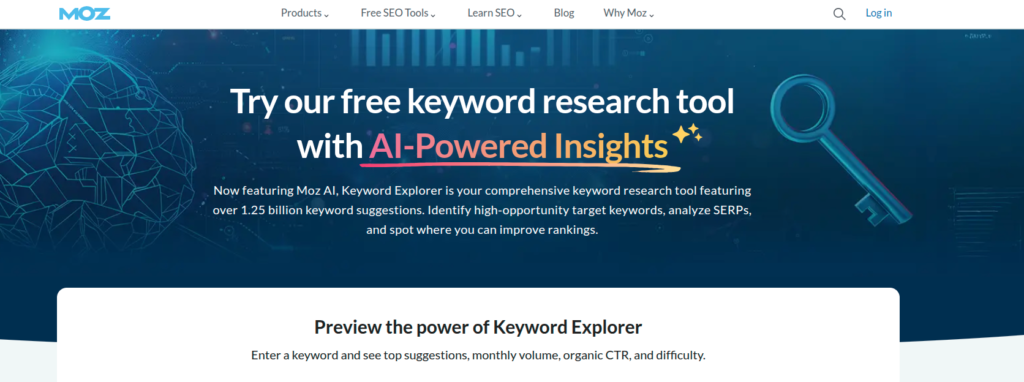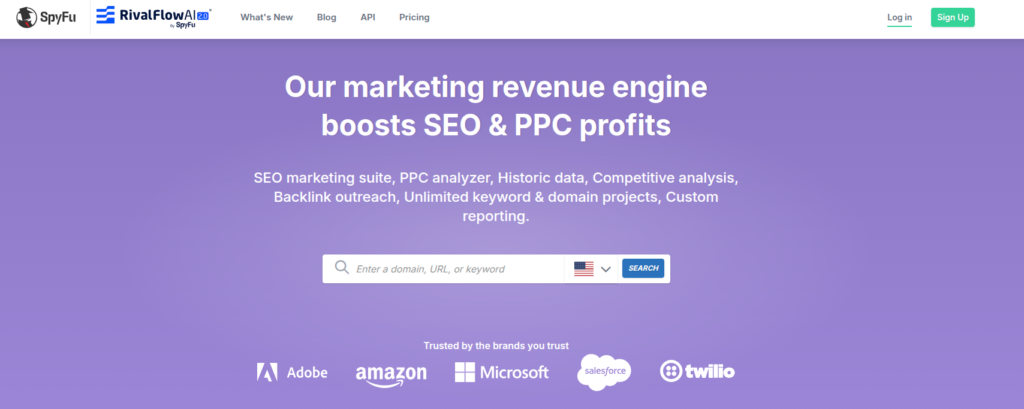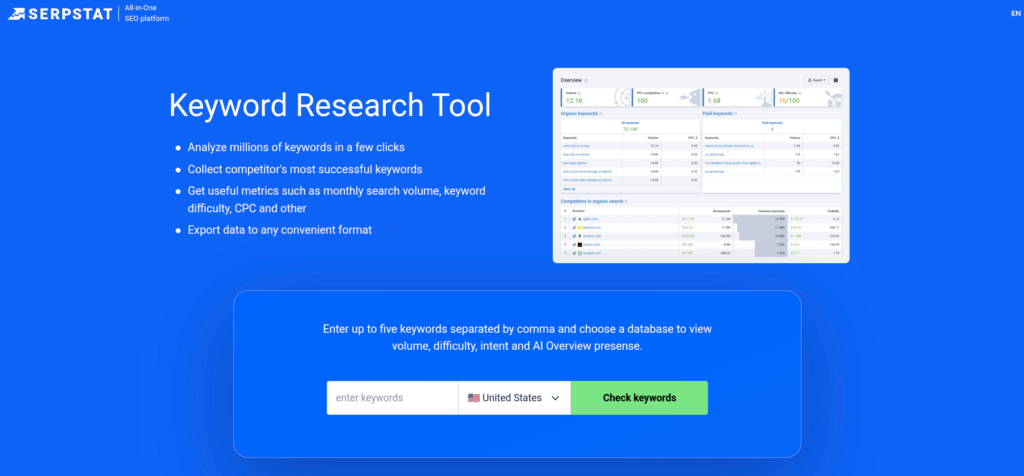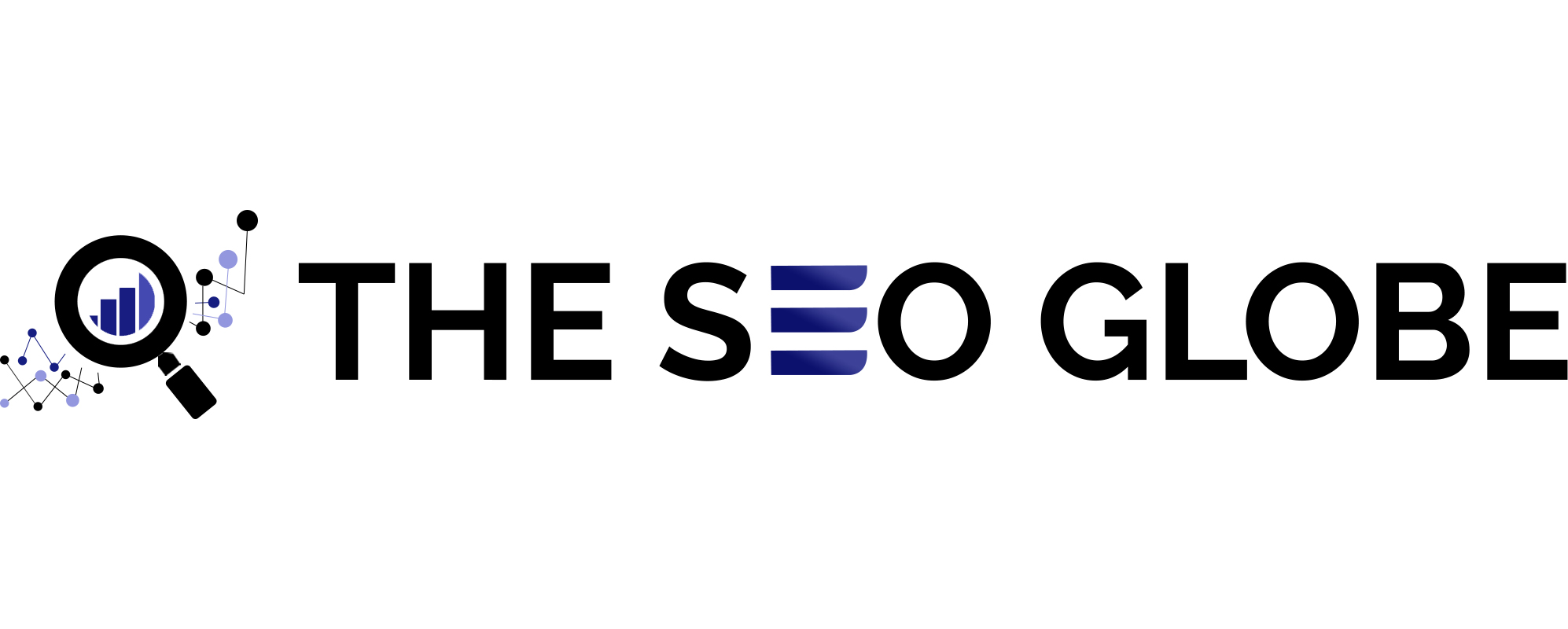In 2025, keyword research tools remain a cornerstone of SEO strategy. With the rise of AI, semantic search, and evolving SERP features, the best keyword tools now blend raw data (volume, difficulty) with semantic insight, keyword clustering, topic expansion, intent signals, and competitor gap analysis. Whether you’re using “best free keyword research tools 2025” or premium suites, this article compares top tools (free vs paid), helps you pick the right one for your needs, and highlights how to leverage them in an AI-driven world.

Pro Tip: To explore the most effective AI-powered tools that complement your SEO efforts, check out our in-depth guide on 25 AI Marketing Tools I Actually Use to Grow My Business in 2025.
Key Takeaways / Quick Summary:
- “Best free keyword research tools 2025” still prominently include Google Keyword Planner, Ubersuggest, AnswerThePublic, Soovle, and Exploding Topics.
- Paid tools (Semrush, Ahrefs, Moz, Mangools) offer deeper data, filtering, competitor gap insights, clustering features.
- The ideal approach: hybrid — free tools for ideation, paid tools for validation and scaling.
- In 2025, optimize not just for keywords, but for semantic relevance, entity coverage, and user intent.
- Use keyword clustering, question-based terms, and monitor SERP features to align with AI / generative SERP paradigms.
- Always validate using multiple sources (tool A vs tool B vs GSC) differences are normal.
- Track performance, iterate, refine, keyword research isn’t a one-time task but an ongoing process.
Why Keyword Research Matters in 2025

Keyword research helps identify the terms and phrases your target audience uses to find products, services, or information related to your business. By targeting the right keywords, you can:
- Improve Search Engine Rankings: Optimizing content with relevant keywords increases the chances of ranking higher on search engine results pages (SERPs).
- Understand User Intent: Discovering what users are searching for helps in creating content that meets their needs.
- Enhance Content Strategy: Keyword insights guide content creation, ensuring it aligns with what users are looking for.
- Stay Ahead of Competitors: Identifying gaps in competitors’ keyword strategies allows you to capitalize on untapped opportunities.
Top Free SEO Keyword Research Tools 2025
These tools are either entirely free or have a generous free tier. They are great especially for bootstrappers, bloggers, small sites, or as supplements to paid tools.
How to Combine Free Tools Smartly
- Seed generation: Use Soovle, AnswerThePublic, or Google Trends to brainstorm ideas.
- Validation: Cross-check potential keywords with Google Keyword Planner or Ubersuggest for approximate volume and CPC.
- Trend & seasonality: Use Google Trends or Exploding Topics to spot rising keywords.
- Cluster & filter: Use Excel, Google Sheets, or even simple logic (e.g. group by “keyword contains X”) to cluster sets.
Top Paid Keyword Research Tools in 2025
Paid tools offer richer data, more features, and flexibility. They’re generally indispensable for serious SEO professionals and agencies.
1. Semrush

- Why choose it: It’s arguably the most complete all-in-one SEO suite. Its Keyword Magic Tool, Keyword Manager, and Keyword Gap analysis are powerful.
- Strengths: Broad database, SERP feature insights, competitive gap tools, topic research, keyword clustering, AI content optimization.
- Weaknesses: Expensive at higher tiers; learning curve.
- Use case: Great for content teams, agencies, mid/large sites.
2. Ahrefs

- Why choose it: Extremely strong in backlink + keyword research. Their Keywords Explorer is well respected in the SEO community.
- Strengths: Accurate click metrics, “Parent topic” suggestions, robust competitor research.
- Weaknesses: No free trial (or limited), may lack some AI-driven content features.
3. Moz Pro / Moz Keyword Explorer

- Why choose it: User friendly, good for small to medium websites.
- Strengths: Clean UI, helpful beginner tools, “Priority” metric that balances volume & competition.
- Weaknesses: Smaller database vs Semrush / Ahrefs.
4. Mangools (KWFinder + SERPChecker, etc.)

- Why choose it: Great for long-tail, lower-competition keyword discovery.
- Strengths: Simple, intuitive, focused on what many SEOs care about (volume + difficulty).
- Weaknesses: Fewer advanced features, smaller keyword database than giants.
5. SpyFu

- Why choose it: Strong competitor / PPC overlap insights.
- Strengths: See what keywords your competitors are buying; good PPC/SEO overlap.
- Weaknesses: Data is scraped, so may be less accurate for smaller, niche sites.
6. Serpstat

- Why choose it: Balanced mid-tier tool for keyword + technical SEO tasks.
- Strengths: Affordable, interface is clean, offers keyword, rank, site audit, gap features.
- Weaknesses: Less data depth at upper ranges; free tier is limited.
7. GrowthBar
- Why choose it: Designed for ease, with built-in AI suggestions.
- Strengths: Fast competitor keyword scraping, built-in blog outline generator, AI tips.
- Weaknesses: Less mature network, fewer advanced filters.
8. Other Tools to Note
- Keywords Everywhere (browser plugin) — cheap, handy for volume/CPC overlays.
- KWLibre (free, limited) or Raven Tools (bundle SEO/marketing).
- Custom AI Tools / LLM Plugins — some SEO tools now integrate LLMs to suggest semantic keyword clusters or topic expansions.
Free vs Paid: Which Should You Use?
| Scenario | Best Strategy |
| You’re just starting / low budget | Start with Google Keyword Planner + Soovle / AnswerThePublic / Ubersuggest. When you hit volume, switch to paid. |
| Running a niche or authority site | Paid tools give you deeper insights; start with something like Mangools or Serpstat. |
| Agency / client work / competitive niches | Use top-tier tools: Semrush, Ahrefs + specialized plugins (e.g. AI clustering). |
| Content ideation, trend hunting | Use free tools like Exploding Topics, Google Trends, combined with paid-tier filtering. |
A hybrid approach (free + paid) often gives you the best of both worlds: ideation from free tools and validation / deep dive via paid.
Choosing the Right SEO Keyword Research Tool :
When selecting a keyword research tool, consider the following factors:
- Budget: Determine whether a free tool suffices or if a paid tool offers better value for your needs.
- Features: Assess the features offered and whether they align with your SEO goals.
- Ease of Use: Choose a tool with an interface you’re comfortable navigating.
- Data Accuracy: Ensure the tool provides reliable and up-to-date data.
Frequently Asked Questions (FAQs)
Q1. What is the best free keyword research tool in 2025?
There’s no one-size-fits-all, but for pure volume + CPC data, Google Keyword Planner remains a top pick. For ideation, tools like AnswerThePublic / Soovle are excellent. Using multiple free tools in tandem often yields the best free-tool setup.
Q2. Are paid tools necessary for keyword research?
Not strictly, but as your site scales and competition grows, paid tools offer the depth, filtering, competitor gap analysis, and productivity boosts that free tools can’t match.
Q3. How many keywords should I target per page?
Rather than many, choose one main keyword as your pillar, then 3–5 semantic / long-tail variants. Use clustering so you don’t over-stuff or dilute your focus.
Q4. How accurate are keyword tools’ volume estimates?
They are estimations, not exact. Different tools may provide different numbers. The relative ranking (which keyword is higher volume than another) is more reliable than absolute numbers.
Q5. How do I spot “rankable” keywords (not too competitive)?
Look for medium volume (in your niche) + low to medium difficulty scores. Use competitor checks: if the top 3 pages are strong, it’s harder. Also, aim for “topic gaps” keywords your competitors rank for but you don’t.
Q6. Can I use one tool for everything?
Yes, tools like Semrush or Ahrefs are full suites. But often adding niche tools (e.g. Question tools, trend tools) fills gaps and keeps your strategy sharp.
Conclusion:
In 2025, choosing the right keyword research tools, both free and paid is crucial for SEO success. By combining insights from multiple tools, understanding user intent, and staying updated on trends, you can significantly improve your search rankings. Start leveraging these tools today to make informed decisions and boost organic traffic.
If you’re just starting, check out the full guide:
Keyword Research Secrets: The Ultimate Guide

